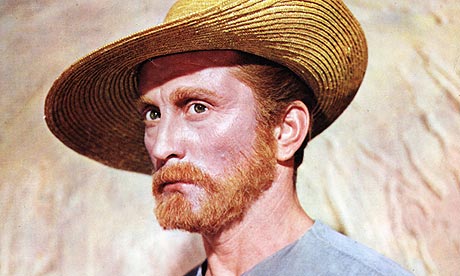Yessir Issur
I just read Kirk Douglas's autobiography The Ragman's Son. A bit odd since it was published about 25 years ago--and sold well, I believe. Born Issur Danielovich in 1916, son of two Russian Jews who had escaped the pogroms, he grew up poor in New York, along with his six sisters. His dad drank a lot but wasn't emotionally demonstrative, and Kirk--a stage name, of course--never fully got over it.
He was a go-getter. With a lot of moxie, he got into St. Lawrence University, and though poor and Jewish (in an age when anti-Semitism was rampant) he actually became a big man on campus. He then went to New York and rose through the ranks on the stage, taking some time out to serve in the Navy during WWII.
He didn't think Hollywood was good for actors but couldn't resist its siren song. In the 40s he became a successful supporting actor, appearing in high-quality projects like Out Of The Past and A Letter To Three Wives, before becoming a star as boxer Midge Kelly in a small, independent film called Champion.
Douglas always had an eye for the ladies, and once he became a celebrity it was anything goes. Even when he was married (something he did twice) he was falling into bed with every beautiful woman around. The most common topic in the book, after making movies, is his many affairs (especially how he chased the beautiful, teenage Piers Angeli).
Douglas, not unlike his pal and regular co-star Burt Lancaster, was a matinee idol who gave intense, athletic performances. Maybe he didn't have the depth and range of a Brando, but he was in a fair share of decent movies and kept stretching. Like Lancaster, he formed a production company and had a lot of say on his projects. One of his best stories is when he talked to John Wayne after the premiere of Lust For Life, where he played Van Gogh. Wayne was disgusted--and maybe drunk--telling Douglas they needed to play tough guys, not queers.
Many of his films are conventional cowboy or action movies, not that well remembered. But a lot of his titles were good enough that they're still remembered and revived--Young Man With A Horn, Detective Story, The Bad And The Beautiful, Gunfight At The O.K. Corral, The Vikings, Spartacus, Seven Days In May. And others--often his favorites--were off the beaten path and not necessarily hits, like Ace In The Hole, Paths Of Glory and Lonely Are The Brave.
He generally played heroes, but was pretty good--maybe at his best--playing edgy characters, often heels. He fought for good roles, and didn't settle when he thought he could do better, which may be one reason he had a reputation for being difficult.
Even when he became a huge movie star he still wanted to prove himself on stage. So he bought the rights to Ken Kesey's book One Flew Over The Cuckoo's Nest and commissioned a play. He starred in it and brought it to Broadway. He claims the audiences loved it, but the critics were gunning for the Hollywood guy, and lambasted it. It ran for several months--Douglas's money kept it open--and after it closed he kept trying to set it up as a film. Finally, about a decade later, his son Michael was able to set it up--but his dad was now too old for the part (at least his son believed so). Of course, the movie version was a gigantic hit and won multiple Oscars, which was a bittersweet thing for Kirk, who made money on the film, but saw it as the one that got away.
Alas, some time around 1970 his films got a lot less interesting, and though he kept working, he wasn't the star he'd been (though I'm a big fan of Brain De Palma's The Fury from 1978). So the final chapters of the book aren't as interesting. When he's not talking about movies I don't think much of, he's going on about world travels or health problems or gossip or political issues of the day which are now fairly dated. (Though this does lead to some interesting moments--such as when he hopes he helped OJ with financial advice, and when he notes Mia Farrow, who just had a son Satchel with Woody Allen, is the best judge of character he knows).
Douglas is still around, and has written a few books since. But if you want a place to start, this is it.
PS. I thought the book was well-written. In fact, well-written enough that I wondered if he had a ghost writer. I saw no other name on the cover, or the title page. But then I saw a little note between the dedication and the table of contents where he thanked Linda Civitello for help in research and writing. I think we've found the culprit.





0 Comments:
Post a Comment
<< Home